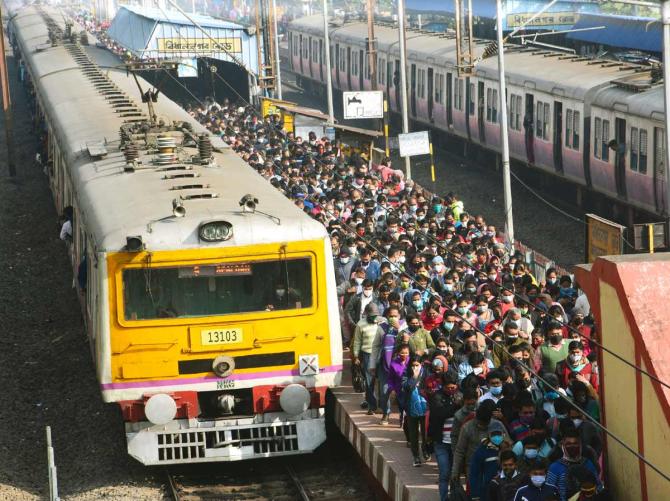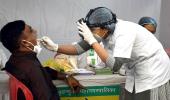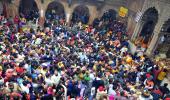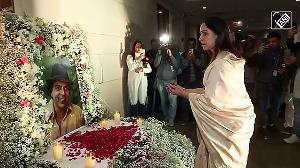India is seeing an exponential rise in the number of coronavirus cases, which is believed to be driven by its Omicron variant, the Centre said on Wednesday, while highlighting that the country's R naught value that indicates the spread of the infection is 2.69, higher than the 1.69 recorded during the peak of the pandemic's second wave.

Addressing a press conference in New Delhi, Indian Council of Medical Research Director General Dr Balram Bhargava said the spike in the number of Covid cases is being witnessed in cities and "the Omicron variant is the predominant circulating strain".
Mass gatherings need to be avoided to lower the speed of the infection spread, he stressed.
"We are now facing an exponential rise in (the number of) COVID-19 cases and we believe that largely, it is being driven by Omicron, particularly so in the western parts of our country and even particularly so in larger cities from where we have more data," NITI Aayog member (Health) Dr V K Paul said.
On December 30, the case positivity rate was 1.1 per cent and the next day, it was 1.3 per cent and now, the country is reporting a positivity rate of five per cent, he said, adding that similarly, there were 13,000 Covid cases on December 30 and the number went up to 58,000 on Tuesday.
"Clearly, this is an expanding pandemic. The R nought value is 2.69. This is higher than the 1.69 we saw when the second wave of the pandemic was at its peak. The acceleration of cases is steeper than ever," Paul said.
He, however, added that the hospitalisation rates are relatively low. It is close to 3.7 per cent in Delhi and five per cent in Mumbai.
"That is the early input we have. Compared to this, last year and even in 2020, the hospitalisation rate was close to 20 per cent," Paul said.
He said though there is no need to panic, people must be alert, disciplined and prepared, adding that the country will face this phase of the pandemic as well.
On whether India is witnessing a third Covid wave, Paul said in other countries, it has been seen that just like a steep rise, there was also a steep decline in the number of cases.
"In Denmark, the UK and South Africa, cases started declining within a month or a month and a half. We cannot say this clearly for our population. How it behaves will depend on past infections, the vaccination status and our own characteristics and population density. It cannot be extrapolated that just like the cases behaved there within a month, it will happen here also.
"Saying it at this stage that it will go on till which point and for how long will be premature. If any scientific data comes, we will share. I would not venture into that except to say that like the previous waves, different parts of our nation will be in different stages. It starts in some states and then goes on and on. We are watching the dynamics of the pandemic carefully," the NITI Aayog member added.
As regards Omicron, officials said while there has been a sharp rise in the number of cases across the country, the hospitalisation rates have remained relatively low as compared to the previous waves of the pandemic.
Joint Secretary in the Union health ministry Lav Agarwal said there has been a surge in the number of Covid cases globally, adding that 25.2 lakh cases of the infection were recorded all over the world on Tuesday, "the highest ever since the onset of the pandemic".
"India has reported an increase of more than 6.3 times in the number of cases in the last eight days and a sharp rise in the case positivity rate from 0.79 per cent on December 29 to 5.03 per cent on January 5," he said.
Agarwal said six states -- Maharashtra, West Bengal, Kerala, Delhi, Karnataka and Tamil Nadu -- have over 10,000 active Covid cases each.
He further stated that Maharashtra, West Bengal, Delhi, Kerala, Tamil Nadu, Karnataka, Jharkhand and Gujarat are emerging as the states of concern.
Also, 28 districts in the country are reporting a weekly Covid positivity rate of more than 10 per cent, while 43 districts are reporting a weekly positivity rate between five per cent and 10 per cent, Agarwal said.
The Centre said 1.06 crore or 14.3 per cent of the beneficiaries in the age group of 15-18 years have been administered the first dose of a Covid vaccine.
There are an estimated 7,40,57,000 beneficiaries in the said age group in the country.
Besides, 90.8 per cent of the adults have been administered the first dose of the vaccine, while 65.9 per cent are fully vaccinated.
On Biological E's Covid vaccine Corbevax, Paul said at an appropriate time, Corbevax research and development was supported by the government, which was very important and relevant.
"It helped create this option and it is available for the new adult population. This vaccine is in trial for paediatric use and they will file a request for a trial as an additional dose. Those two dimensions continue to be relevant.
"Secondly, if such a stock pile becomes available, it will also be available for export if at some point, India does not need it. We have an advanced purchase arrangement for certain doses. We are exploring how to use them. What needs to be done will be unfolding soon," he said.










